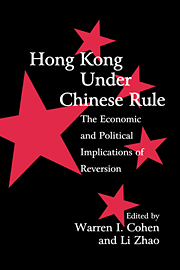Book contents
- Frontmatter
- Contents
- List of Contributors
- Introduction
- 1 Hong Kong as an International Commercial Center
- 2 Cooking the Rice without Cooking the Goose: The Rule of Law, the Battle over Business, and the Quest for Prosperity in Hong Kong after 1997
- 3 Hong Kong Faces 1997: Legal and Constitutional Issues
- 4 The Economic and Political Integration of Hong Kong: Implications for Government–Business Relations
- 5 Hong Kong and Greater China: An Economic Perspective
- 6 One Country, Two Currencies: Monetary Relations between Hong Kong and China
- 7 Political Participation in Hong Kong: Trends in the Mid-1990s
- 8 Strategic and Military Implications of Hong Kong Reversion
- 9 Hong Kong and China's Integration into the International Community
- 10 Hong Kong as a Problem in Chinese–American Relations
- 11 Post–July 1997 Challenges
- Index
9 - Hong Kong and China's Integration into the International Community
Published online by Cambridge University Press: 22 March 2010
- Frontmatter
- Contents
- List of Contributors
- Introduction
- 1 Hong Kong as an International Commercial Center
- 2 Cooking the Rice without Cooking the Goose: The Rule of Law, the Battle over Business, and the Quest for Prosperity in Hong Kong after 1997
- 3 Hong Kong Faces 1997: Legal and Constitutional Issues
- 4 The Economic and Political Integration of Hong Kong: Implications for Government–Business Relations
- 5 Hong Kong and Greater China: An Economic Perspective
- 6 One Country, Two Currencies: Monetary Relations between Hong Kong and China
- 7 Political Participation in Hong Kong: Trends in the Mid-1990s
- 8 Strategic and Military Implications of Hong Kong Reversion
- 9 Hong Kong and China's Integration into the International Community
- 10 Hong Kong as a Problem in Chinese–American Relations
- 11 Post–July 1997 Challenges
- Index
Summary
THE way in which the Chinese authorities manage the return of Hong Kong will greatly affect the next stage of China's integration into the international community. China is already a major player in international politics and in the international economy. However, its domestic political and economic structures and practices are not yet fully congruent with those of the international community. Hong Kong, by contrast, is in many ways regarded as a model of good practice according to the conventions and ideals espoused by the leading institutions of the international economy. Although Hong Kong, as a British colony, has not been an assertive political entity on the world stage, it has nevertheless been of political importance. In part, that importance has flowed from its role both as an international financial center of major regional significance and as a meeting point between different Chinese communities.
If the return of Hong Kong is managed well – so that its autonomy as a separate system follows in practice the outline of the Sino-British agreement and the Basic Law – the beneficial consequences for China will inevitably serve to accelerate and deepen its integration into the international community. This will enable the Chinese Communist authorities to demonstrate a capacity to encompass, within the sovereignty of the People's Republic of China (PRC), an enclave that follows laissez-faire capitalism under the rule of law, with an independent judiciary, a freely and fairly elected legislature, and an autonomous executive guided by a politically neutral and efficient civil service that allows its people basic freedoms.
- Type
- Chapter
- Information
- Hong Kong under Chinese RuleThe Economic and Political Implications of Reversion, pp. 198 - 212Publisher: Cambridge University PressPrint publication year: 1997
- 15
- Cited by

